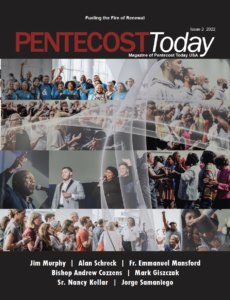6th Sunday in Ordinary Time
Meditation and Questions for Reflection or Group Discussion
Mass Readings:
1st Reading: Leviticus 13:1-2, 44-46 Responsorial: Psalm 32:1-2, 5, 11
2nd Reading: 1 Corinthians 10:31–11:1 Gospel: Mark 1:40-45
The Importance of Doing Everything for the Glory of God
Brothers and sisters, whether you eat or drink, or whatever you do, do everything for the glory of God. (1 Corinthians 10:31)
Ash Wednesday is this week. While some of us are keen to begin Lent, some may feel disheartened at the prospect of keeping their Lenten resolutions. If this is you, don’t worry. Paul’s words have come at just the right time. Not only is this verse encouraging, but it’s a fitting theme for Lent—something you can return to again and again for inspiration and direction.
Brothers and sisters. First, remember that you won’t be embarking on this journey alone. You are swept up into a vast family called the Church. This multitude will be walking arm in arm with you as you follow Jesus on his road to the cross. You can always call on these traveling companions for encouragement and support in prayer. What’s more, you can always ask your Father to send down reinforcements of grace if the going gets tough!
Whether you eat or drink, or whatever you do. Remember, the kingdom of God isn’t a matter of eating and drinking (Romans 14:17). Neither is it a matter of not eating and drinking. So don’t get hung up on the details of your resolution. And don’t worry if you slip up every now and then. Instead, keep your focus on your love for Jesus. Running errands. Doing laundry. Caring for a spouse. Even fasting. These can all become opportunities to let your love for God work itself outward into every nook and cranny of your life.
Do everything for the glory of God. If you’re still feeling unsure about Lent, cling to the motto of St. Ignatius of Loyola: “For the greater glory of God.” God is shown to be glorious when his children offer their daily tasks to him and find happiness in glorifying him. This is the heart of Lent: putting aside temporary pleasures in order to become satisfied in God.
“Lord, here’s all my life—for your glory.”
Download this reflection with discussion questions here.
(Many thanks to The Word Among Us for allowing us to use meditations from their monthly devotional magazine. Used with permission. For more information on how to subscribe to their devotional magazine, go to www.wau.org).
Sunday, February 11, 2018
Questions for Reflection or Group Discussion:
- The first reading describes the harsh Jewish laws concerning lepers: “The one who bears the sore of leprosy The one who bears the sore of leprosy shall keep his garments rent and his head bare, and shall muffle his beard; he shall cry out, ‘Unclean, unclean!’ As long as the sore is on him he shall declare himself unclean, since he is in fact unclean. He shall dwell apart, making his abode outside the camp.”
- In addition to the suffering caused by the disease of leprosy, why did declaring a leper as unclean and having him “dwell apart” from the community make his suffering even worse?
- Although leprosy is no longer a major disease today, in what ways have other diseases replaced leprosy as “unclean,” causing those afflicted with the disease to feel “unclean” and set apart?
- What more can you do as a Christian to reach out to those who are sick and suffering, including those who might be considered modern day “lepers”?
- In the responsorial psalm, the psalmist describes the confession of his sins to the Lord with these words: “I acknowledged my sin to you, my guilt I covered not. I said, ‘I confess my faults to the LORD,’ and you took away the guilt of my sin.” The psalmist also speaks of the wonderful fruits of confessing our sins: “Blessed is he whose fault is taken away, whose sin is covered. … Be glad in the LORD and rejoice, you just; exult, all you upright of heart.”
- Why do you think the psalmist talk of being blessed, glad, rejoicing, and exalting in the Lord after confessing his sins?
- Why should this response be even more true for us as Catholics after receiving the Sacrament of Reconciliation? Is it yours? Why or why not?
- The second reading ends with these words of St. Paul: “Be imitators of me, as I am of Christ.”
- What are some ways that Paul was an imitator of Christ?
- Why is the witness of our lives so important in drawing people to Christ and his Church? How are you doing?
- What are some areas of your life that may need to change so that others can see Christ in you in a clearer way?
- The Gospel reading begins with these words: “A leper came to Jesus and kneeling down begged him and said, ‘If you wish, you can make me clean.’ Moved with pity, he stretched out his hand, touched him, and said to him, ‘I do will it. Be made clean.’ The leprosy left him immediately, and he was made clean.”
- How does Jesus’ reaching out and touching the leper also demonstrate his great compassion and love for him?
- What impact do you think this touch by Jesus had on the leper apart from the healing?
- The meditation ends with these words: “Do everything for the glory of God. If you’re still feeling unsure about Lent, cling to the motto of St. Ignatius of Loyola: “For the greater glory of God.” God is shown to be glorious when his children offer their daily tasks to him and find happiness in glorifying him. This is the heart of Lent: putting aside temporary pleasures in order to become satisfied in God.”
- What do you think it means to “Do everything for the glory of God”?
- What steps can you take during the grace-filled season of Lent to allow you to put “aside temporary pleasures in order to become satisfied in God”?
- Take some time now to pray and give your life to the Lord for all he has done and ask him for the grace to do all things for his glory. Use the prayer below from the end of the meditation as the starting point.
“Lord, here’s all my life—for your glory.”
[The discussion questions were created by Maurice Blumberg, who is currently a member of the board of directors of the ChristLife Catholic Ministry for Evangelization (www.christlife.org/) and a member of the National Service Committee Council of the Catholic Charismatic Renewal (www.nsc-chariscenter.org). Maurice was also the founding Executive Director of the National Fellowship of Catholic Men and a former chairman of the board of The Word Among Us (www.wau.org). He can be contacted at (Enable Javascript to see the email address) mblumberg@wau.org or mblumberg@aol.com.]


 Click Here for us to pray for your intentions through our new website.
Click Here for us to pray for your intentions through our new website. 
